House price growth slows in October after September high
The annual growth rate was 2.4% last month, as market activity ‘remained relatively resilient’, according to Nationwide.

Your support helps us to tell the story
From reproductive rights to climate change to Big Tech, The Independent is on the ground when the story is developing. Whether it's investigating the financials of Elon Musk's pro-Trump PAC or producing our latest documentary, 'The A Word', which shines a light on the American women fighting for reproductive rights, we know how important it is to parse out the facts from the messaging.
At such a critical moment in US history, we need reporters on the ground. Your donation allows us to keep sending journalists to speak to both sides of the story.
The Independent is trusted by Americans across the entire political spectrum. And unlike many other quality news outlets, we choose not to lock Americans out of our reporting and analysis with paywalls. We believe quality journalism should be available to everyone, paid for by those who can afford it.
Your support makes all the difference.House price growth slowed in October, with valuations rising 0.1% month on month, according to an index by Nationwide.
The annual growth rate was 2.4% last month, easing back from a two-year high of 3.2% in September, the building society said.
The average UK house price in October was £265,738, according to the figures.
Robert Gardner, Nationwide’s chief economist, said: “Housing market activity has remained relatively resilient in recent months, with the number of mortgage approvals approaching the levels seen pre-pandemic, despite the significantly higher interest rate environment.
“Providing the economy continues to recover steadily, as we expect, housing market activity is likely to continue to strengthen gradually as affordability constraints ease through a combination of modestly lower interest rates and earnings outpacing house price growth.”
Nationwide said “solid” labour market conditions, with low levels of unemployment and wage growth, had helped drive a steady rise in market activity and valuations this year.
The building society said chancellor Rachel Reeves’s decision to let the price at which buyers start paying stamp duty fall back to pre-2022 levels in the Budget would affect the timing of deals.
Mr Gardner said buyers would “aim to ensure their house purchases complete before the tax change takes effect.
“This will lead to a jump in transactions in the first three months of 2025 (especially March), and a corresponding period of weakness in the following three to six months, as occurred in the wake of previous stamp duty changes.”
However, the swings in activity are likely to be “less pronounced” this time, because the planned changes had been known about in advance.
Nathan Emerson, chief executive of Propertymark, said: “As the wider economy has become more settled, it’s encouraging to witness greater affordability and confidence flow through the housing market.
“With strong hints we may see a steady reduction in base rates implemented over the coming months, there is substantial scope to round the year with an upbeat tone to be carried forward into 2025.”